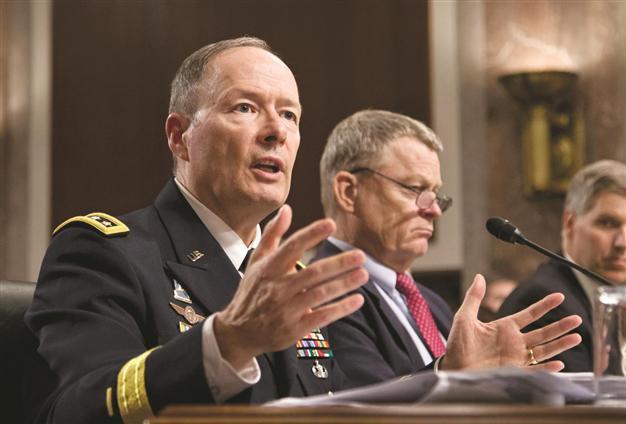US spy chief defends intel tactics amid growing debate
WASHINGTON - Agence France-Presse

General Keith B. Alexander, director of the National Security Agency and head of US Cyber Command, answers questions from lawmakers on Capitol Hill in Washington. AP photo
The U.S. spy chief in charge of a leaked program to gather and analyze Internet and phone data defended the intelligence tactic on June 12, insisting it had helped thwart dozens of terror attacks.Facing skeptical questions from lawmakers after a rogue technician revealed the secret operation, National Security Agency (NSA) chief General Keith Alexander insisted it operates under proper legislative and judicial oversight.
“It’s classified but it’s dozens of terrorist events that these have helped prevent,” he told the hearing, the first time he had been questioned in public since 29-year-old former contractor Edward Snowden spilled the beans. “I want the American people to know that we’re being transparent in here,” he insisted, warning that “the trust of the American people” was a “sacred requirement” if his agency was to be able to do its job. Asked if the light shone on the programs could help terrorists avoid surveillance, Alexander said: “They will get through, and Americans will die.”
“Great harm has already been done by opening this up. The consequence I believe is our security has been jeopardized,” he warned.
Snowden, a technician seconded by a private contractor to an NSA base in Hawaii, disappeared last month after downloading a cache of secret documents and surfaced over the weekend in Hong Kong to give media interviews.
He embarrassed and infuriated President Barack Obama’s administration by revealing that the NSA had gathered call log records for millions of American phone subscribers and targeted the Internet data of foreign Web users.
The leaks triggered a row over privacy and the limits of executive power in the digital age, as Snowden said had been his intention, but also calls for the leaker to be arrested and sent home to face trial. Snowden told Hong Kong daily the South China Morning Post that he would resist any attempt to extradite him, and accused the NSA of carrying out tens of thousands of hacking attacks worldwide.
Pledge to resist any extradition
“I’m neither traitor nor hero. I’m an American,” he said. He pledged to resist any extradition attempt. “I have had many opportunities to flee HK, but I would rather stay and fight the U.S. government in the courts, because I have faith in HK’s rule of law,” he said, according to the paper.
Many people hail Snowden as a whistleblower who carried out an act of civil disobedience to expose U.S. government overreach and defend the privacy of innocent Web users.
Others, including U.S. spy chiefs and some senior lawmakers, say Snowden a traitor who sold out a system that serves to protect Americans.
NSA Chief Keith Alexander said he had “grave concerns” about how Snowden was able to gain access to critical classified information with a limited education and not much work experience, noting: “We do have to go back and look at these processes.” Several investigations are underway and the leaker may yet face criminal charges, but in the meantime, debate is raging about the legality and utility of the NSA’s broad-brush approach to sweeping up private data. “How do we get from reasonable grounds... to all phone records, all the time, all locations?” asked Sen. Jeff Merkley, a longtime opponent of giving the government broad secret surveillance powers.
Holding up his own phone, he asked Alexander: “What authority gave you the grounds for acquiring my cell phone data?” Alexander repeated the administration’s defense that, while the NSA did gather large quantities of telephone metadata, it could not mine the logs to target a specific user without an order from a secret court.
“We do not see a trade-off between security and liberty,” he said, insisting that the NSA and U.S. Cyber Command are “deeply committed to compliance with the law and the protection of privacy rights.”
“I do think what we’re doing does protect American civil liberties and privacy,” he protested, claiming he welcomed the “debate” sparked by the leaks.
















